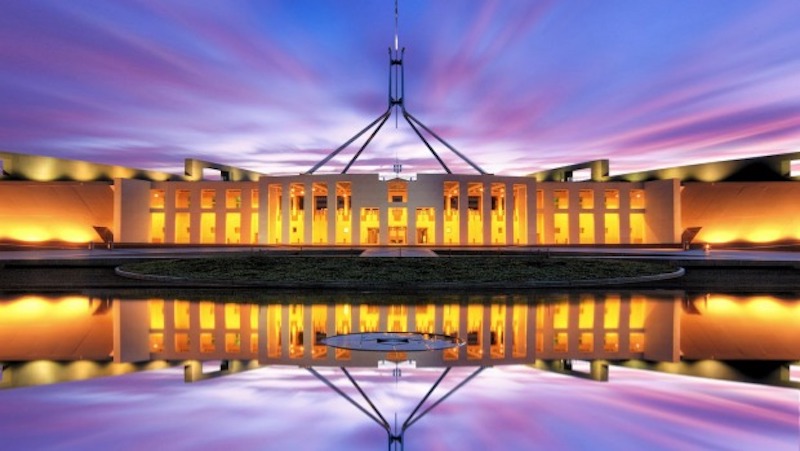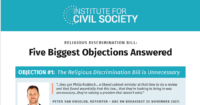ICS Executive Director, Mark Sneddon, responds to the SSM survey results:
A PDF version can be found here.
- Australians have spoken clearly in the same sex marriage postal survey. 61.6% of those who voted are in favour of same sex marriage. That is a clear mandate and the Parliament should legislate for same sex marriage.
- Polls before and during the survey also showed a strong majority of Australians in favour of protections for freedom of speech, association, conscience and religion. Those protections are needed for people like the 38.4% of Australians (4.8 million) who voted to maintain the traditional definition of marriage as between a man and a woman and for their associations and organisations which hold to traditional marriage.
- Before and during the campaign both in Australia and overseas we have seen plenty of examples of supporters of traditional marriage being discriminated against and being subject to attacks on their freedom of speech, conscience and religion. A list of examples appears below. There were also deplorable examples of behaviour against same sex oriented Australians too. As I explain below, people of same sex orientation have plenty of legal protection from bullying and discrimination against them but people who hold to traditional marriage beliefs do not have anywhere near that level of legal protection.
- To redress this imbalance in legal protections and to help to deter legal culture wars, legislation to allow same sex marriage also needs to protect people and organisations with traditional marriage beliefs from bullying, pressure and discrimination directed against them; bullying which is designed to push them into supporting or endorsing same sex marriage against their deepest convictions or at least keeping their convictions hidden and quiet.
To be very clear I am not arguing for legislation which gives permission to those with traditional marriage beliefs to discriminate against same sex oriented people or couples. I am arguing for legislation to protect those with traditional marriage beliefs from being discriminated against because they hold, express or act lawfully based on those beliefs.
- Some same sex marriage advocates argue that these issues of protecting those who support traditional marriage have nothing to do with legalising same sex marriage and that same sex marriage has no effect on people other than the couple getting married. Try telling that to the young woman in Canberra who during the campaign put up on her Facebook page that it was OK to vote No and was promptly sacked just for doing that and called a bigot and a homophobe by her employer. Or the NSW university academic who same sex marriage advocates pressured his employer to sack if he didn’t resign from his involvement in his own time on the board of an organisation that opposed same sex marriage. Or Dr Pansy Lai who appeared on a No campaign advertisement and was then the subject of telephone and social media threats and an online petition by over 5,000 people to the AMA to have her deregistered as a doctor. Threats, bullying and sackings against supporters of traditional marriage are inextricably linked to the legalisation of same sex marriage, which is why we need to legislate balanced protections for supporters of traditional marriage at the same time as legalising same sex marriage.
- The current anti-discrimination laws in Australia are significantly unbalanced in who they protect in this debate. They protect same sex oriented Australians from discrimination in every State and Territory and federally (and hence protects supporters of same sex marriage because that is a commonly associated characteristic with same sex orientation.)
- But their protection of Australians who hold to traditional marriage is very patchy and incomplete. They do not at all protect Australians who support traditional marriage from a conscientious conviction not based in religious conviction (e.g. many parts of the Chinese community and others from traditional cultures and many indigenous Australians). And federal law, NSW and South Australian antidiscrimination laws do not protect Australians who support traditional marriage based in religious conviction. (The Fair Work Act anti-discrimination provisions do not protect people in NSW or South Australia from employment discrimination because the FWA is subject to the same limits as the State laws in those two States). And nowhere in Australia do anti-discrimination laws protect small businesses, associations, charities, or schools from detriment because they adhere to a belief in favour of traditional marriage. For example, the laws do not protect such organisations from governments discriminating against them in the provision of funding, economic benefits, licensing, or permits because they support traditional marriage.
- It is this significant imbalance in legal protections which leave people and organisations who support traditional marriage exposed to discrimination, bullying and threats against them.
- Legislating for same sex marriage exacerbates these specific problems of discrimination which is why they need to be fixed at the same time as we legislate for same sex marriage and not put off to next year or the more distant future.
- Nor should these problems be pushed off to consideration of a broad-based Bill of Rights. This is a specific set of problems related to legalising same sex marriage and Australia’s unbalanced anti-discrimination laws. It can be fixed with a focused set of protections for people with a very specific set of beliefs in traditional marriage. We don’t need to solve it by trying to protect all beliefs and all religions and all rights that—would be using an Exocet missile to crack a nut.
- Most importantly the problem needs to be solved at the same time we legislate for same sex marriage. Once same sex marriage becomes law that immediately flows through into the scope and operation of federal, State and Territory anti-discrimination law, vilification law, charities law, and many other laws.
- Legislating for same sex marriage immediately opens up the scope for complaints under some of our overly broad anti-vilification laws against a Muslim, Christian or other person who speaks against same sex marriage, on the grounds that they are insulting or offending married or soon to be married same sex couples. This is not a hypothetical. There was a 7 month complaint, ultimately withdrawn, under the Tasmanian vilification laws against the Catholic Bishops for their statement of traditional Catholic beliefs on marriage, and there are now 2 current complaints under the same law against a Presbyterian Minister and a street preacher. Legislating for same sex marriage immediately opens up the argument that charities which support traditional marriage but not same sex marriage are no longer eligible for charitable status and tax exemptions. And just as important practically, legislating for same sex marriage seems to embolden the more extreme supporters of same sex marriage to go after others who support traditional marriage using theses legal weapons.
- It is the legislation for same sex marriage which would create these problems. So it is the legislation for same sex marriage which should solve them so they are not created by putting in place appropriate protections.
- These problems can be fixed in the Bill to legalise same sex marriage with appropriate protections for Australians who support traditional marriage from discrimination (and which do not give them any right to discriminate against same sex oriented Australians). Senator Smith’s Bill protects only ministers of religion and the use of religious facilities in same sex weddings. It does nothing to protect the young woman or the university academic or ordinary Australians and small business and charities and schools from being discriminated against because of their support for traditional marriage.
- Senator Paterson’s Bill contains many more useful provisions giving that sort of basic protection from detriment and discrimination which all Australians should enjoy, not just those who support same sex marriage. But all the other provisions in his Bill which provide protective shields to people and organisations which support traditional marriage should be considered for inclusion in the legislation to legalise same sex marriage so that legislation protects the freedoms of all Australians on both sides of this debate.
Mark Sneddon, Executive Director
Examples Showing the Need for Legal Protections from Discrimination and Detriment Against People and Organisations Supporting Traditional Marriage
- In the United Kingdom, the Charities Commission for England and Wales removed the charitable status of 19 Catholic adoption and foster agencies because they preferred not to adopt or foster to same-sex couples. This caused many of these agencies to close down or transfer their operations as they were no longer exempt for the purposes of tax.
- In New Zealand, Family First was deregistered by the Charities Board because of its commitment to traditional marriage which no longer could be regarded as a public benefit.
- In Johns v Derby County Council 2011¸ the English High Court supported a local council decision that a Christians couple with traditional views on sexual ethics, who had successfully fostered many children, would not make suitable foster carers because they would not be open to promoting or accepting a homosexual lifestyle.
- In New Jersey the government declared that a Methodist organisation would no longer receive a real estate tax exemption when it declined to allow a same sex couple to have a commitment ceremony in a pavilion that was used for Church services, youth ministry programs and weddings.[1]
- In Tasmania, a booklet outlining the Catholic position on same-sex marriage distributed by a Catholic Archbishop was held by the Antidiscrimination Commissioner to be a possible violation of anti-vilification legislation.[2] The matter proceeded to a conciliation session but was eventually abandoned after many months by the complainant.
- In Kentucky, a law clerk was imprisoned when she refused to issue marriage licences to same-sex couples.[3]
- In 2011 Adrian Smith from Manchester in England placed on his Facebook page a comment that he did not think that churches should be compelled to marry same-sex couples, although he did not object to same-sex marriage. This was before England allowed same-sex marriage. He was accused by his employer, a housing association, of “gross misconduct” and threatened with dismissal. Because of his long service, he was only demoted; but he lost 40% of his salary.[4]
- In Australia, calls were made for Dr Stephen Chavura to be dismissed by Macquarie University unless he resigned from another organisation that was perceived to be opposed to same-sex marriage.
- In Australia, Dr Pansy Lai had a petition, which gained 5000 signatures, circulated calling for her deregistration due to her comments about same-sex marriage and safe schools in a No campaign TV commercial to deregister her as a doctor.
- In the United States of America, Chick Fil A was subject to commercial boycotting because of management’s views and donations supporting tradition marriage. As part of this local governments and universities refused to allow new Chick Fil A franchises.
- In Australia, complaints are current underway against Presbyterian Minister Campbell Markham and street preacher David Gee for expressing their views on same-sex marriage.
- In Washington State, Barronelle Stutzmann was successfully sued in the Benton County Superior Court for declining a request to provide flowers for a same sex wedding.[5]
- In Vermont, Catholic innkeepers were sued after declining to host a wedding reception.
- In Willock v Elane Photography LLC25 a photographer who declined to photograph a same-sex marriage ceremony was found to have discriminated on the grounds of sexual orientation and had costs awarded against her.[6] In Illinois, the owners of a bed and breakfast face a lawsuit for refusing to host a civil union ceremony.
- In McFarlane v Relate Avon Limited, a relationship counsellor was dismissed from his employment after expressing concerns about providing counselling services to same-sex couples.[7]
- In the United Kingdom, the Vishnitz Jewish Girls School failed their school-assessment on one criteria, which was its inadequate promotion of homosexuality and gender reassignment, as it was deemed that these were necessary to have a full understanding of fundamental British values and equality principles.
- In British Columbia, Trinity Western University required their students and staff to sign a community covenant which included a promise to abstain from sexual activity, unless it was between a husband and wife. Due to this the British Columbia College of Teachers voted to refuse accreditation to all teaching graduates because they might discriminate against LGBTI students. After many years of litigation, the Supreme Court of Canada upheld the right of Trinity graduates to be accredited.
- In Canada, Four Provincial (State) Law societies decided to refuse accreditation to the planned law school and program of Trinity Western University on the grounds that the community covenant of the university was discriminatory, not on any grounds relating to the quality of the curriculum or faculty of the law school. The effect of the decision would be to deny graduates of the law school the right to practise law in those Provinces. Two of those Provinces reversed the decision and in the other two ligation about the decisions has been through the Provincial Courts and is now to be heard by the Supreme Court of Canada.
- In Northern Ireland, Ashers Bakery company, run by a Christian couple, was found liable for discrimination because it refused to bake a cake for a political group with the slogan “Support Gay Marriage”. Ashers led evidence that it had never refused to supply a person on the grounds of their sexual orientation and did not do so in this case but refused only because it would not disseminate or be associated with the message on the cake. The court held that the sexual orientation of the person who ordered the cake was irrelevant and the refusal to provide a cake with that message on it amounted to discrimination.
Note: These examples have been taken from the supporting material for the Bill by Senator James Paterson
[1] Jill P Capuzzo, ‘Group Loses Tax Break Over Gay Union Issue’, The New York Times (online), 18 September 2007 <http://www.nytimes.com/2007/09/18/nyregion/18grove.html>.
[2] Dennis Shanahan, ‘Catholic bishops called to answer in anti-discrimination test case’, The Australian (online), 13 November 2015 <http://www.theaustralian.com.au/nationalaffairs/state-politics/catholic-bishops-called-to-answer-in-antidiscrimination-test-case/newsstory/b98439693f2f4aal7aca9b46c7bda776?nk=7bd2d275fddd376333435b60d3ac81 Ic1474942859>. 30 Andrew Drummond, ‘Transgender rights activist Martine Delaney drops complaint over Catholic Church’s marriage booklet’, The Mercury (online), 5 May 2016 <http://www.themercury.com.au/news/tasmania/transgender-rights-activist-martinedelaney-drops-complaint-over-catholic-churchs-marriage-booklet/newsstory/d8d9079bf932526b27e5f094e57dbe84?nk=7bd2d275fddd376333435b60d3ac81 c1474933967>.
[3] Alan Blinder and Richard Perez-Pefia, ‘Kim Davis, Released From Kentucky Jail, Won’t Say if She Will Keep Defying Court’, The New York Times (online), 8 September 2015 <http://www.nytimes.com/2015/09/09/us/kim-davis-same-sex-marriage.html>.
[4] Smith v Trafford Housing Trust [2012] EWHC 3221.
[5] Ingersoll v Arlene’s Flowers (Superior Court of the State of Washington, No 13-2-00871-5, 18 February 2015).
[6] (Human Rights Commission of the State of New Mexico, HRD No. 06-12-20-06854 September 2008).
[7] McFarlane v Relate Avon Limited [2010] EWCA Civ 880.








Recent Comments